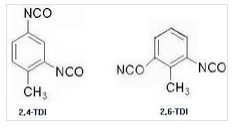TDI (Toluene Diisocyanate)
Toluene diisocyanate (TDI) has two isomers: 2,4-toluene diisocyanate and 2,6-toluene diisocyanate.
English abbreviations: TDI; 2,4-diisocyanate toluene ester; 2,4-diisocyanate toluene ester; toluene-2,4-diisocyanate; 2,4-diisocyanate-1-methyl benzene; toluene diisocyanate; toluene diisocyanate; toluene 2,4-diisocyanate; 2,4-diisocyanate; 2,4-diisocyanate toluene
Molecular formula: C9H6N2O2; CH3C6H3 (NCO) 2.
Industrial uses
TDI (toluene diisocyanate) is one of the commonly used polyisocyanates, and polyisocyanates are polyurethane (PU) materials and important basic raw materials. TDI commonly used in polyurethane industry is a mixture of 2,4-TDI and 2,6-TDI isomers, including three commonly used brands: TDI-80/20, TDI-100 and TDI-65/35. The preceding figures indicate the content of 2,4-TDI in the composition. For example, 80 in TDI-80/20 indicates that its composition is 80% 2,4-TDI and 20% 2,6-TDI; 100 in TDI-100 basically represents 2,4-TDI (about 98%) and 2,6-TDI has few isomers. It is mainly used for producing flexible polyurethane foam and polyurethane elastomers, coatings, adhesives and so on.

Toluene Diisocyanate is a synthetic mixture of the 2,4- and 2,6-isomers is a volatile, colorless to pale yellow liquid that is soluble in many organic solvents. These isomers are used primarily in the synthesis of polyurethane foams. When heated to decomposition, toluene diisocyanate emits toxic fumes of cyanides and nitrogen oxides. Exposure of humans to toluene diisocyanate causes tissue irritation, especially to the mucous membranes, and can produce severe respiratory problems. These isomers are reasonably anticipated to be human carcinogens.
IUPAC
2,4-diisocyanato-1-methylbenzene
SMILES
CC1=C(C=C(C=C1)N=C=O)N=C=O













